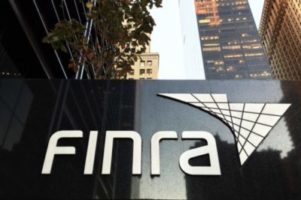 Stockbrokers that engage in the sale of reverse convertible securities often like to hype the yield associated with these securities but fail to disclose that when the price of the securities to which the reverse convertible note is linked, increase in value the investor’s return is limited to the stated coupon on the note. However, when the price of the security to which the note is linked, decreases in value, and investors can lose their entire investment. Accordingly, investors’ upside potential is limited, but they bear 100% of the downside risk.
Stockbrokers that engage in the sale of reverse convertible securities often like to hype the yield associated with these securities but fail to disclose that when the price of the securities to which the reverse convertible note is linked, increase in value the investor’s return is limited to the stated coupon on the note. However, when the price of the security to which the note is linked, decreases in value, and investors can lose their entire investment. Accordingly, investors’ upside potential is limited, but they bear 100% of the downside risk.
In February 2010, FINRA issued Notice to Members 10-09, and subsequently issued an Investor Alert with respect to the sale of Reverse Convertible Notes.
According to FINRA: Reverse exchangeable securities, commonly called “reverse convertibles,” are popular structured products with retail investors, due in large part to the high yields they offer. However, reverse convertibles are complex investments that often involve terms, features and risks that can be difficult for retail investors and registered representatives to evaluate. Firms are also reminded to ensure that their registered representatives understand the risks, terms and costs associated with these products, and that they perform an adequate suitability analysis before recommending them to any customer.
 FINRA issued Notice to Members 10-09; See also, Staff Summary Report on Issues Identified in Examinations of Certain Structured Securities Products Sold to Retail Investors, U.S. Securities & Exchange Commission (July 27, 2011)(“Some reverse convertible notes are he equivalent to the investor writing/selling a put option on the underlying equity. Such notes lend themselves to being improperly marketed as conservative fixed income investments when in fact they may be very susceptible to volatile or falling equity prices and may carry considerable risk of loss”).
FINRA issued Notice to Members 10-09; See also, Staff Summary Report on Issues Identified in Examinations of Certain Structured Securities Products Sold to Retail Investors, U.S. Securities & Exchange Commission (July 27, 2011)(“Some reverse convertible notes are he equivalent to the investor writing/selling a put option on the underlying equity. Such notes lend themselves to being improperly marketed as conservative fixed income investments when in fact they may be very susceptible to volatile or falling equity prices and may carry considerable risk of loss”).
With respect to Reverse Convertible securities, FINRA has also cautioned its members that:
“Firms that do not limit reverse convertibles to accounts approved for options trading should develop other comparable procedures designed to ensure that reverse convertibles are only sold to persons for whom the risk of such products is appropriate.
These firms should be prepared to demonstrate the basis for allowing investors with accounts not approved for trading options to purchase reverse convertibles.”
 Firms must have adequate written supervisory procedures and supervisory controls that are reasonably designed to ensure that sales of reverse convertibles comply with the federal securities laws and FINRA rules and must also adequately train employees who sell, or who supervise those who sell, reverse convertibles.
Firms must have adequate written supervisory procedures and supervisory controls that are reasonably designed to ensure that sales of reverse convertibles comply with the federal securities laws and FINRA rules and must also adequately train employees who sell, or who supervise those who sell, reverse convertibles.
“Reverse Convertible Securities” also known as “Reverse Convertible Notes,” are “structured products that typically consist of a high-yield, short-term note of the issuer that is linked to the performance of an unrelated reference asset, usually common stock, a basket of stocks, an index or another instrument.” Regulatory Notice to Members 10-09 (“Reverse Convertible Notes”)(February 2010).
As a “Complex Investment Product,” FINRA specifically requires that the recommendation and sale of “Reverse Convertible Securities,” (also known as Reverse Convertible Notes) be subject to special “heightened supervision.” Regulatory Notice 12-03 (Jan. 17, 2012)(“Heightened Supervision of Complex Products”).
“Reverse Convertible Securities” are also a relatively new investment product. FINRA has consistently reminded its members of the obligation of firms “to deal fairly with customers when making recommendations or accepting orders for new financial products. Regulatory Notice to Members 10-09 (quoting NASD Conduct Rule IM-2310-2(e)).
In fact, FINRA expressly requires that members must perform a “reasonable basis suitability analysis” for each reverse convertible they recommend, that firms must maintain written evidence of supervision, and registered representatives “who sell, or who supervise those who sell, reverse convertibles, are required to undergo special training.” Regulatory Notice to Members 10-09 (“Reverse Convertible Notes”)(February 2010).
The United States Securities & Exchange Commission (“SEC”) has also been concerned that these new investment products, which “have been increasingly marketed to retail investors, who have been interested in generating income in the low-yield interest-rate environment, without adequately disclosing to customers the material risks associated with investing in Reverse Convertible Notes or Securities.” SEC Staff Summary Report on Issues Identified in Examinations of Certain Structured Securities Products, U.S. Securities & Exchange Commission (July 27, 2011). The SEC is particularly concerned that these investment products may be “marketed to conservative or other investors as suitable, when in fact they may not be suitable.” See also, SEC Office of Compliance Inspections and Examinations (Aug. 24, 2015).
Structured Securities Products, at least according to FINRA Dispute Resolution rank among the “Top 15 Security Types in Customer Arbitrations.” The widespread sale and marketing of Reverse Convertible Securities, as the SEC has observed, has also resulted in more than a dozen regulatory actions, and fines in excess of $15 million against member firms and their registered representatives. SEC Office of Compliance Inspections and Examinations (Aug. 24, 2015).
A non-exhaustive list of these Enforcement Actions include:
• In the Matter of UBS Financial Services Inc. 2011-8200, File No. 3-17587 (September 28, 2016)(UBS censured, fined and ordered to pay disgorgement of a total of $9.25 million in connection with the “inadequate education and training, unsuitable recommendations to certain customers, and the Failure to Supervise” the sale of Reverse Convertible Securities);
• Department of Enforcement v. H&R Block Financial Advisors, Inc. (n/k/a Ameriprise Financial Services, Inc.), Letter of Acceptance, Waiver & Consent No. 2007011933101 (January 10, 2010)(H&R Block fined and sanctioned $275,000 for the failure to establish and implement an adequate system and written Procedures for the supervision of Reverse Convertible Notes in the accounts of retail customers);
• Department of Enforcement v. Wells Fargo Investments, LLC, Letter of Acceptance, Waiver & Consent No. 2008015651901 (Sept. 29, 2022)(Wells Fargo censured and fined $2 Million for the failure to supervise Unsuitable Reverse Convertible Securities Transactions);
• Department of Enforcement v. Santander Securities Corporation, Letter of Acceptance, Waiver & Consent No. 2008011719301 (Apr. 12, 2012)(Santander Securities Corporation censured and fined $2 Million for the failure to supervise sales of Reverse Convertible Securities and Structured Products);
• Department of Enforcement v. RBC Capital Markets, LLC, Letter of Acceptance, Waiver & Consent No. 2010022918701 (Apr. 23, 2015)(RBC Capital Markets fined $1 Million for the failure to establish reasonable systems and procedures to supervise sales of Reverse Convertible Securities);
• Department of Enforcement v. Capitol Securities Management, Inc., Letter of Acceptance, Waiver & Consent No.2011025548801(October 20, 2015)(Capitol Securities Management, Inc. censured and fined $470,000 for the failure to establish, maintain and enforce an adequate supervisory system and written supervisory procedures for the sale of Reverse Convertible Notes);
• Department of Enforcement v. Ferris, Baker Watts Inc., Letter of Acceptance, Waiver & Consent No. 2007009180301 (Sept. 29, 2010)(Ferris, Baker Watts fined and ordered to pay disgorgement totaling $629,723 for the failure to establish, maintain, and enforce written procedures reasonably designed to supervise registered representatives who sold reverse convertible securities).
If you have been sold reverse convertible securities by your stockbroker or financial professional and have suffered losses, you should consult with an attorney to determine your legal rights and obligations. All claims are time sensitive and the failure to bring your claim within a specified period of time may operate to permanently bar any such claims.
Guiliano Law Group
Our practice is limited to the representation of investors. We accept representation on a contingent fee basis, meaning there is no cost to you unless we make a recovery for you. There is never any charge for a consultation or an evaluation of your claim. For more information, contact us at (877) SEC-ATTY.
For more information concerning common claims against stockbrokers and investment professionals, please visit us at securitiesarbitrations.com
To learn more about FINRA Securities Arbitration, and the legal process, please visit us at securitiesarbitrations.com
